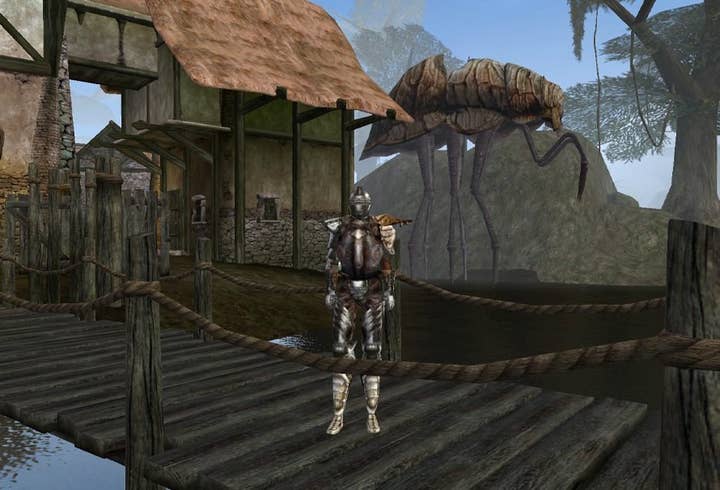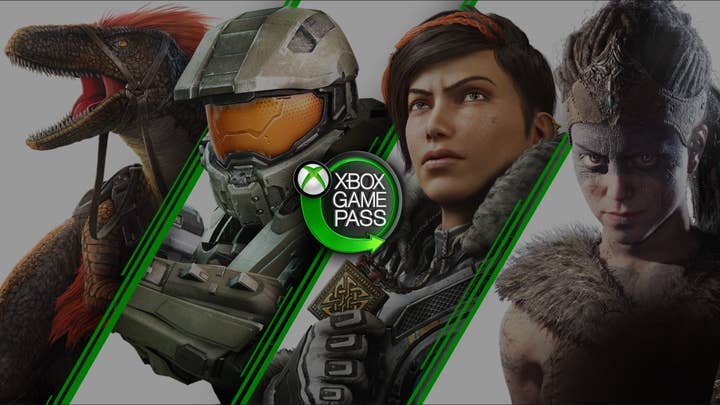A missed target reveals Game Pass' growing pains | Opinion
The subscription service may be beloved for its back catalogue - but even more so than Xbox itself, it desperately needs high-profile new software to drive growth
Game Pass is Microsoft's game changer -- or at least, that's the plan. It entered this generation with a grand ambition not just to challenge Sony's dominance of the high-end console space, but to reshape the space itself, unpicking some of the very notions of what a console generation is, and what constitutes a gaming platform.
Its weapons in this fight aren't hardware -- the company probably knew quite a long way out that the Xbox Series X and PS5 were going to be pretty evenly matched on that front, at least as far as the average consumer is concerned -- but services. This is a playbook it used to great effect the last time it pushed Sony onto the back foot, with the Xbox 360's online services running rings around the PlayStation's too-little, too-late efforts; this time around, it's Game Pass that's Microsoft's ace in the hole, the service that's meant to both make an end run around the competition's offering and lock consumers into a wholly new vision of gaming platforms and services that's intrinsically untethered from any individual piece of hardware.
The centrality of Game Pass -- tacitly acknowledged in the company's decision to use its subscriber growth as one of the metrics upon which executive compensation packages are calculated -- means it's inevitable that its growth figures will be followed closely by anyone with a stake in the industry's fortunes. The company doesn't give updates on subscriber numbers often -- the last we got was in January, when they reported roughly 18 million subscribers for the service -- but it did start reporting that topline growth number in its 2020 financials, when it healthily overshot its 71% growth target to report almost 86% growth over the course of the year.
Game Pass growth is a slightly sore point at present; it has significantly missed its 47% growth target, reporting only a 37% rise in subscription numbers over the year
This year, however, those fortunes are reversed, with a financial filing ahead of its shareholder meeting revealing that Game Pass growth is a slightly sore point at present; it has significantly missed its 47% growth target, reporting only a 37% rise in subscription numbers over the year.
There are two ways to look at the undershoot. One is that the predicted 47% figure was already conservative, given that it achieved 86% growth in the previous year, so the numbers Microsoft failed to hit were already reflective of significantly dialled-down expectations; not great.
The other way to look at it, however, is that this was naturally going to be a year in which numbers dipped after the artificially high growth caused by pandemic lockdowns, so Microsoft arguably just underestimated the steepness of the curves this unprecedented event would cause. It's consistent in this at least: it underestimated the upside last year, and the downside this year. This more optimistic approach calls for averaging out the performance of the past couple of years, and would lead to an expectation that growth will revert to a comfortable mean in the coming year.
The thing is, I'm not entirely convinced that a supposed dip in demand after the pandemic really does explain everything about this plummet from 86% to 37% growth -- not least since plenty of other game companies seem to be experiencing an ongoing boom rather than a post-pandemic slide in their revenues. Rather, I think what we're seeing here is actually a pretty good reminder that Game Pass, for all that it's a brilliant service beloved by many of its millions of subscribers (myself included), is actually a hell of a tough thing to undertake, and it's inevitable that it's going to run into some growing pains along the way -- perhaps to an extent that Microsoft itself hadn't quite recognised at the outset.
I'll preface all of this by saying that 37% growth for a service with numbers that hit 18 million subscribers fairly early on in this reporting period is by no means a bad figure -- but the temptation to roll your eyes and say "oh, poor Microsoft, only another six million-odd people paying them ten to fifteen bucks a month, however will they cope" ought to be tempered by the recognition of what a drop in the ocean that kind of figure is for a trillion-dollar business like Microsoft.

Giant companies like Microsoft, Apple and Google routinely call time on business divisions that would be the crown jewel of a smaller company, but that just aren't worth their time and focus -- which creates an internal environment in which any division that's not hitting its growth goals needs to find a way back to that growth path very quickly. A growth undershoot at this point is not the figure Microsoft needs to be hitting in order to realise its goals for Game Pass as the beating heart of its decentralised gaming platform strategy -- all of which makes it important to ask what other reasons may lie behind that missed target, and how they might be remedied.
Ongoing hardware shortages, of course, haven't helped -- but not to put too fine a point on it, it's been a somewhat dull year on the Game Pass front. That the library has grown is undeniable, of course, but it's largely been in the form of back catalogue titles, with arguably the most interesting development being the addition of various Bethesda games to the service over the course of the year.
For all the value it offers in terms of back catalogue, Game Pass faces exactly the same fundamental challenge as any game console in history when it comes to actually getting people to subscribe in the first place
Indeed, the same financial report which revealed the growth undershoot also included a single bullet point about Game Pass' highlights in the past year -- namely the launch of 20 of Zenimax' back catalogue titles on the service, which for all that many of these games are beloved, is a pretty weak thing to pull out as your full-year highlight for your great shining hope for the future of gaming. A few Xbox exclusives have launched day-and-date on Game Pass, but it would be hard to point to one that seems likely to have pushed a lot of consumers over the edge into punching in their credit card details and becoming Game Pass subscribers.
That's really what this comes down to; for all the value it offers in terms of back catalogue, Game Pass faces exactly the same fundamental challenge as any game console in history when it comes to actually getting people to subscribe in the first place. The back catalogue value offering is a retention mechanism -- it's a reason for people to stay in the system once they've taken the first step -- but to get those customers in requires big, high-profile titles that people really want to play and for which Game Pass offers the best way (for reasons of cost or functionality) of doing so.
This is where the service falters right now, precisely because Microsoft's own first-party title line-up is still faltering -- the company's studio and publisher acquisitions still haven't borne fruit, and though the promise of what's to come is enticing for many consumers, first-party software on Xbox remains an unsteady colt and not the racehorse we're all hoping it'll become. Hope for a future line-up is reason enough for many consumers to buy a console, but it's not a reason to put down money on a Game Pass subscription right now, when they can just wait and start forking over that cash later on once the games actually appear.
This is the context in which we should read Phil Spencer's comments about Microsoft being prepared to acquire more game studios: Spencer understands well that Game Pass is going to have a monstrous appetite for headline, exclusive games if it's to keep up its growth metrics. Microsoft's goal with any future acquisition will arguably be less about taking software away from rivals like Sony (that's just a side-effect, in most cases), and more about feeding that ravenous appetite for content without which the service upon which it's pinned its hopes in this sector will see its growth stutter and stumble.
For all its enormous advantages both for Microsoft and for consumers (and for publishers and developers, maybe, at least in terms of its prospects as a long-tail revenue generator), Game Pass is likely going to be even tougher to support with content than a traditional console is. Consumers buy a console up-front to play certain games, and if there's a gap in the release schedule when nothing interests them, well, so be it -- the console stays under their TV until the next big release. With a subscription service, however, long gaps between games consumers are excited about can not only result in drying up the spigot of new customers, but actually cause growth to backtrack by making existing customers feel antsy about the money they're paying each month. Back catalogue, groundbreakingly brilliant as Game Pass' may be, will only go so far in terms of locking in that customer retention.
Don't underestimate the struggle Game Pass faces in this regard: Microsoft's first-party game operation is gathering pace, but right here, today, it still isn't capable of holding a candle to rivals Sony and Nintendo, which is going to be a major problem given that with Game Pass and its ambitious growth plans, it has created a challenge for itself that exceeds anything those companies need to accomplish with their first-party publishing efforts.

